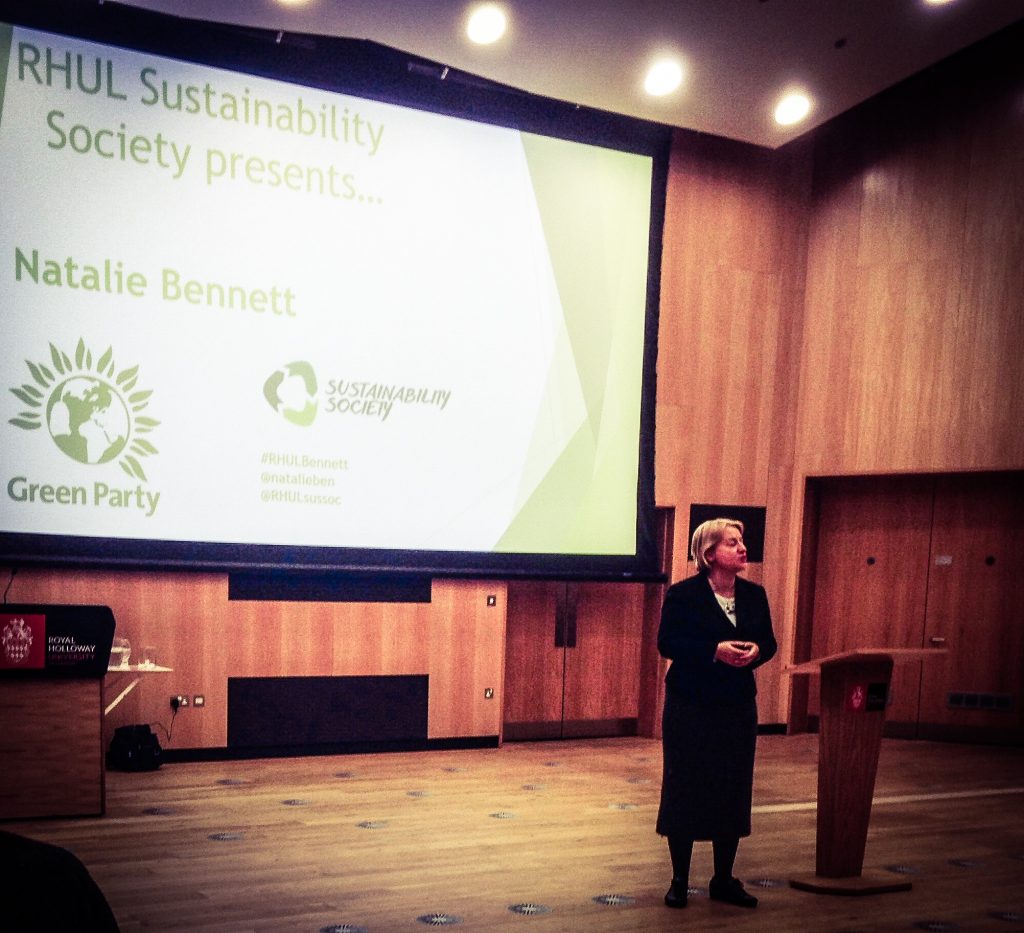
Former journalist Natalie Bennett is the leader of the Green Party. Despite its status as a relative outsider, the party has enjoyed a spike in popularity in recent years, dispelling an alleged stereotype around the party as that of a group of environmental hippies. Bennett covered a wide range of current events in her recent talk at RHUL from the current housing crisis to the question of Britain’s position in the EU, showing that the party has highly sophisticated wide-ranging aims and policies; a shocker for anyone who still believes that all the Green party care about is implementing policies to benefit vegetation and wildlife.
Bennett began her talk with what she called a ‘compulsory’ apology from her generation to the younger one, claiming that responsibility must be taken for the environmental crisis that we are inheriting from a series of poorly-made decisions and judgements in the past. If only politicians apologised more often; it’s about as rare an occasion as a spin-doctor telling the truth. She went on to describe the ‘sea of plastic soup’ as a key indicator of the detrimental environmental issues that we are faced with, as sea pollution will, according to research, reach its peak in 2050, by which point the weight of plastic in the sea will be greater than that of fish. As unappealing as that image is, the political leader really demonstrated her realism and enthusiasm towards tackling global warming, which still, despite its crucial state, is being largely ignored by MPs unless the elections are drawing near.
With the much-anticipated EU referendum edging closer, Bennett of course advocated her opinion on the matter, raising some strong points as to why remaining within the agreement would benefit Britain. What we should learn from the TTIP scandal, she states, is that working together allows us more strength and voice to prevent such controversial and undemocratic power play from international businesses. (TTIP is the ‘Transatlantic Trade and Investment Partnership’, a series of trade negotiations secretly discussed between the EU and the US about reducing the regulatory barriers to trade for big business organisations such as food safety law or banking regulations).
Her prime example is the demonstration in Berlin against TTIP, in which around 100,000 people took part (October 2015), as well as the European Citizens’ Initiative which has acquired over 3.2 million signatures in petition regarding this topic, just in a year. Together, she argues, we have more of a chance at fighting against the influence of large corporations, which after all, affect all of us with their proposed plans, instead of turning our back on our allies and weakening our political power overall, in tackling international issues.
Many have attempted to use TTIP as an example of how Britain would be better off outside the EU, as the nation wouldn’t be affected by such trade negotiations and foreign intervention from big businesses, however Bennett puts such rumours to one side with her statement that ‘if we left the EU, the UK would sign a TTIP agreement with the US in a minute’. Her brutal honesty really made a point here, further emphasised as she refused the alternate argument at present of Cameron’s failures in EU negotiation as reason for leaving the agreement altogether: ‘His tactic of “give me what I want, or I’m leaving” is not likely to be effective, is it?’. Not really, considering he has employed the debating tactics of a five year old.
However, the Green Party leader was not quick to brush aside the negative sides to the EU, as she acknowledged that more democracy was needed within its organisational structure, and that countries should work together to create a better EU that works for local communities over businesses. What the overall reaction to TTIP shows is that countries can work together for a common good type of society, and should choose this path rather than to split apart and fight for the same changes separately.
Ultimately, the key issue that the Green Party leader claimed to be of vital importance is the ongoing struggle to implement significant political reform, even when essential, as Britain’s political system remains very much conservative. Example needed? The last real reform, as cited by Natalie Bennett, was women gaining the vote in 1918; despite all this time, only 29.4% of MP’s in the country are female, placing Britain 64th in the world for women in Parliament, an extremely dismal figure. It’s all a vicious cycle: conservative and cautious policies prevent real change. That harbours disillusionment from the public, which then stops people from wanting to vote. British politics is in urgent need of a new political sustainable model, ‘for the next few decades’ at least, as Bennett argues.
